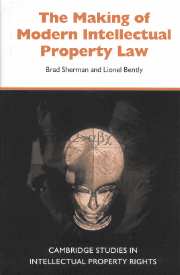Book contents
- Frontmatter
- Contents
- Acknowledgments
- List of abbreviations
- Table of statutes and bills
- Table of cases
- Introduction
- Part 1 Towards a property in intangibles
- Part 2 The emergence of modern intellectual property law
- Part 3 Towards an intellectual property law
- Part 4 Transformations in intellectual property law
- Bibliography
- Index
11 - Remembering and forgetting
Published online by Cambridge University Press: 29 May 2025
- Frontmatter
- Contents
- Acknowledgments
- List of abbreviations
- Table of statutes and bills
- Table of cases
- Introduction
- Part 1 Towards a property in intangibles
- Part 2 The emergence of modern intellectual property law
- Part 3 Towards an intellectual property law
- Part 4 Transformations in intellectual property law
- Bibliography
- Index
Summary
While gradual, haphazard and in some ways still incomplete, the move from pre-modern to modern intellectual property law marked an important transformation in the law which granted property rights in mental labour. In this chapter we concentrate on the fact that at the same time as modern intellectual property law emerged as a separate and distinct category, the law also began to develop a series of narratives by which this newly formed entity was explained and justified. We hope to highlight the role played by the stories that the law tells about itself in the making and remaking of intellectual property law. In part, the emergence of these explanatory narratives was a consequence of the fact that profound changes in consciousness such as that brought about by the formation of modern intellectual property law ‘bring with them characteristic amnesias. Out of such oblivions, in specific historical circumstances spring narratives’. One of most interesting things about the narratives which developed during the second half of the nineteenth century, which played and continue to play such an important role in informing modern intellectual property law, is that in many ways they are at odds with the history that we have outlined here. For example a central theme of the explanatory narratives of modern intellectual property law has been that creativity played at best an ambivalent and at worst an extremely limited role in this area of law: a suggestion which is in marked contrast to the way we have presented pre-modern (and to a lesser extent) modern intellectual property law. While the explanatory narratives may often be at odds with the history of intellectual property law we have presented here, this should not be taken as suggesting that these narratives are false and that they therefore ought to be ignored. Similarly, while we wish to question the perceived history of the subject we do not, however, reject such a history. Rather, if we suspend our realist assumptions we see that as ‘real fictions’ these narratives played an important role in constituting and reinforcing the identity and selfimage that the law has of itself. Moreover, we also see that the image that the law has of its past plays an important role in shaping its present and its future.
Information
- Type
- Chapter
- Information
- The Making of Modern Intellectual Property LawThe British Experience, 1760-1911, pp. 205 - 220Publisher: Cambridge University PressPrint publication year: 1999
